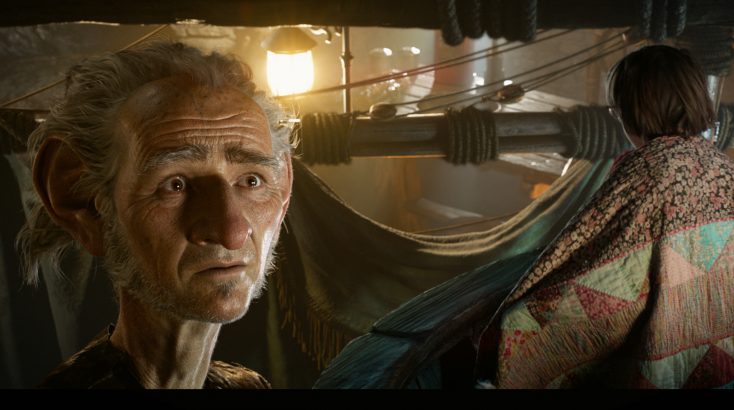
The BFG (Oscar (TM) winner Mark Rylance), a Big Friendly Giant from Giant Country shows Sophie around in THE BFG. ©Storyteller Distribution Co, LLC.
By ANGELA DAWSON
Front Row Features
HOLLYWOOD—A speech impediment as a child may have led BAFTA and Oscar winner Mark Rylance (best supporting actor for “Bridge of Spies”) to become an actor.
“I couldn’t be understood by anyone until I was six,” Rylance revealed during a recent interview. “I would speak gibberish.”
His father, a teacher, would take him to speech therapists, but the actor feels what really helped him was watching actors speak on TV. His favorite show was the American western “The Wild Wild West.” He and his young friends would reenact what they saw on the show and eventually Rylance not only could be understood, but audiences eventually would pay to watch him perform.
Born Mark Waters in Ashford in Kent, his parents moved the family to America when he was a toddler. He returned to his homeland as a young man to study drama at RADA and got his break on the stage with the Royal Shakespeare Company. He used only part of his name for his stage name because there already was a professional actor named Mark Waters.
The low-key and thoughtful performer, now 56, is married to English musical director Claire Louise Van Kampen, with whom he raised two stepdaughters.
Having achieved numerous kudos over the years for his extensive stage and film work, Rylance also has become the go-to character actor for legendary filmmaker Steven Spielberg. He not only starred opposite Tom Hanks in Spielberg’s acclaimed espionage thriller “Bridge of Spies,” he now stars in Spielberg’s big screen adaptation of Roald Dahl’s fantasy adventure “The BFG,” playing the titular Big Friendly Giant in which he stands 24-feet tall thanks to motion-capture technology and some movie magic. Rylance also is set to star in Spielberg’s next project, the science fiction dystopian drama “Ready Player One,” based on Ernest Cline’s award-winning novel.
With his white fedora hat and brown and white checkered shirt and brown pants, Rylance looks like he just breezed in from the golf course before sitting down to talk about “The BFG,” in which he plays a giant who befriends a young orphan, much to the disdain of his fellow human-eating giants.
As the interview commences, the actor stands for a few minutes marveling at reporters’ assortment of recorders, recalling that he often records accents when he’s on the road in the event he may want to tap into a certain sound one day. For “The BFG,” he says, that habit paid off.
Rylance: One of the voices that inspired me for BFG was a voice I recorded in 1982. There’s an old anonymous play called “Arden of Faversham,” written around Shakespeare’s time. At 22, I went to Faversham to see it what it was like. I saw this teenage boy with a shaved head and strange gear, and he had this unusual accent. He had an earpiece and a wire that plugged into nothing. (In a Faversham accent) “Yeah, Interpol. I’ll be there.” He lived in a tent on the edge of town, which caught fire regularly. He was such a “BFG” character. I had my little recorder because I was trying to get the Faversham dialect; I don’t know what dialect he had. So I just recorded it. When this part came along, I knew I thought, “Oh, yeah, Mad Jim of Kent.”
Q: What appealed to you about BFG?
Rylance: He’s a curmudgeonly old man. He’s lonely but he has developed a craft to deal with being on his own. He’s doing his best and trying to make good after making a bad mistake in the past when the other kid died. I like his odd sense of humor and the way he speaks. I like pretty much everything about him, the way he changes and the way he listens to people and thinks.
Q: What was your reaction to seeing yourself on screen as the giant?
Rylance: It was the most expensive makeup I’ve ever had. It’s better than when I normally see myself because it was distanced by the (CG-generated enlarged) ears and the makeup. Whenever I see the film I’m amazed at the way it works because I remember the parts, and this film, because of the scale, we were on different sets for my parts and for Ruby’s parts. So the fact that it looked like and felt like we were having a conversation and it was all fluid, I was kind of amazed by that.
Q: You’ve worked with Steven Spielberg on two very different types of movies now. Was the experience of working with him any different?
Rylance: He was challenged on “The BFG” by the technical front line that he wanted to do, and he’s doing it again with “Real Player One” now. Initially, I could see that Steven, even with all of his experience, was quite overwhelmed in the first few days by what he, as a director, had to keep in his mind—all the different ways the images were being fed to him. Certainly, on “Bridge of Spies,” it felt like riding in a big Cadillac. It was smooth and I could see he knew what he wanted to do. Still, even on “Bridge of Spies,” he was thinking all the time what’s this film about? He didn’t have a title for it. He’ll often come in having not slept the night before and I’d say to him, “Why couldn’t you sleep?” And he’ll have watched three or four film. He’d come in and say it me, “What’s this film about?” And, eventually, he said, “Ah, it’s about the bridge of friendship between Tom Hanks’ character and my character. And then the title came to him. So in both projects, he’s been very immersed as stories, deeply immersed. Then, for this, he got on top of it. But for the first week, it was technologically challenging for all of us.
Q: Does he give you a lot of one-on-one input as an actor? Does he give you a lot of freedom?
Rylance: I don’t know how he directs other people and I suspect that he’s changed since he was a young director. I suspect that he’s more confident. He’s incredibly enthusiastic and friendly and I felt enormous freedom. I don’t feel the freedom to fuck up his movie. (He chuckles.) But I feel enormous freedom to play. That’s where I like to find things. With Melissa (Mathison, the screenwriter) and Steven, every day, I was bringing words from the book, more Gobblefunk (a language created by Roald Dahl). It looks rather challenging to read on the page, but when you hear it in a sentence, “They’re going to lock me up in the Telly-Telly Bunkum Box.” English people immediately understand that because of “Telly-Telly.” So it’s not as difficult as when you read it. Steven allowed me to try more Gobblefunk words, and if he felt it was too much, he’d take them out. There are scenes in the film that were not in the script.
Q: You said earlier you struggled with words as a youngster. Were you shy or did you have a stammer?
Rylance: No. I couldn’t be understood by anyone until I was about six.
Q: Is that because you were raised in America but you’re British?
Rylance: (laughs) No. It was before that. (He speaks gibberish.) I think I spoke like that. But I don’t really remember. I met a kid later on when I was about 10, and he said he remembered I was the kid in kindergarten who didn’t speak all year. I do remember that—just shutting up. Because when I did speak, people always said, “What?” And they got annoyed with me. I remember my father took me to speech therapy courses to learn how to speak. I feel like learned how to speak by pretending to be James West in the “Wild Wild West.” I never got to play that part, actually. I was always (West sidekick) Artemis Gordon. My friend was always James West. And another kid was always the villain, because we needed someone to chase. And he always wanted to play the girl. So we always had to make a deal with him as to how much time he got to be the girl so he would also be the villain like Miguelito Loveless. “The Wild Wild West,” what a great show that was.
Q: You consider yourself a theater actor first. What’s the difficulty of transitioning to a film actor and do a film like “Bridge of Spies,” and then do a complete 180 and do something like “The BFG?”
Rylance: Doing complete 180s is what I’m in it for. I enjoy that. It’s liberating. To look at life from a different perspective and slow your heart down or speed it up or change the way you speak or the way you walk, all that’s much more comfortable for me than going around as myself. In another case, I’d be in an insane asylum. (He laughs.) But I happen to make a living at it. The difference between theater and film is a bit like playing a championship match of tennis with millions of people watching you with no warm up. In the theater, you get six weeks of warm up and preparation. Now, that’s OK because sometimes the first game of tennis I have or the first game of pool is the best one. (He laughs.) After a while, your mind goes, “Wait a minute! I can’t play tennis that well.” So it collapses. Actually, the difference is that it doesn’t need to last in film. In theater, it needs to last, especially if you’re doing a successful play for four years, 420 performances. So you train like you’d train for a marathon with a lot of background stuff to rely on. In the cinema, once they’ve got it they’ve got it.
It’s a little frightening, the cinema. I start Monday on “RPO.” I don’t know quite yet how (my character) sounds. I have a couple of ideas. Which of them is right? I don’t know.
Q: You brought such great depth to Thomas Cromwell in the TV series “Wolf Hall.” Is there going to be a second series of the show?
Rylance: Hilary Mantel is writing (the next book). She’s referring back to it. I think it’s going to be interesting because she says it’s going to be a long book. It’ll come round. And then you’ll see me (cutting motion across his throat)





